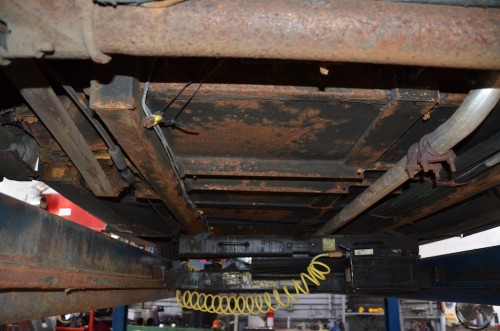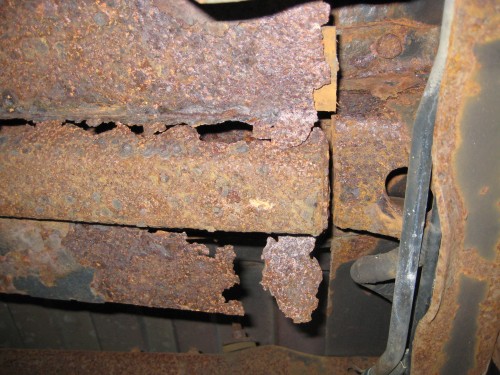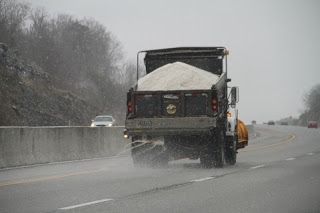We recommend keeping the bottom door track of your handicapped van clear of any debris by vacuuming out the track every 2 or 3 weeks. Debris in the bottom track will cause the door motor to work harder and even weaken or burn out prematurely. Such problems will only be more of an inconvenience in cold weather.
Check Your Brakes
Make sure your brakes are in good working condition. You should never postpone having brake work done because you never know when you might have to drive on snowy or icy roads.
Check Your Lights
Headlights are essential in snowy weather; not only do they help you see clearly, but they also help others see you. So you make sure your lights are clean and that all bulbs and fuses are working properly.
Remember Your Fluids
We advise having all fluids (including brake fluid, antifreeze, washer fluid, transmission fluid, power-steering fluid, etc.) checked and “topped off.” In addition, we also recommend that you consider keeping a half tank of gas in your accessible vehicle at all times–you don’t want to run out of gas in an emergency.
Don’t Forget Your Battery
Having your battery checked is especially crucial for handicapped accessible vans. The cold weather is strenuous on any battery but even more so on an accessible van’s battery. An accessible van has to power ramps, lifts, and doors, so it uses more battery power than other minivans. A common problem we see at our Mobility Center is customers who do not drive their accessible van enough to keep the battery charged and healthy. You can keep the battery charged by driving your vehicle more than 3 hours a week or by using a battery charger. Under normal conditions, batteries will typically last for 3½ years, so if your battery is older than that, we recommend that you make sure that it’s in good condition or think about replacing it.
Good Tire Maintenance Is Crucial
Good tires might be one of the most essential driving tools in winter weather. Worn, bald, badly aligned, or badly balanced tires can cause accidents in any type of slippery weather. You’ll need to test the air pressure and tread on your tires and have your tires rotated so that the better ones are in the front for more traction and control. If you need new tires soon, don’t wait, get them now! If you have snow tires and live in areas with heavy and frequent snowfall, don’t hesitate to use them.
Don’t Forget Your Windshield
Taking care of the windshield on your wheelchair van entails more than having good wipers. Windshields on minivans and full-sized vans are large, so having good wipers and properly functioning rear and front defrosters are musts. Also, small dings in a windshield can become large cracks when it’s cold. Cracks are a result of the stress of having freezing temperatures on the outside of the windshield and the warm heater on the interior of the windshield. If this occurs, fix the ding and avoid the risk of replacing a costly van-sized windshield!
Snow Equipment
If you ever get stuck or break down in snow or other inclement winter weather, having the appropriate equipment to get yourself out of your vehicle is important. We recommend keeping a shovel, sidewalk salt, snow scraper/brush, jumper cables, spare tire, jack, and flares in your vehicle during the winter months. Also, if you live in an area with frequent and/or heavy snowfall, keep tire chains in your vehicle for extra traction.
Emergency Kit
Another recommendation is keeping a snow emergency kit in your car. Your emergency kit should include a cell phone, a cell-phone car charger, a blanket, a flashlight with good batteries, hand warmers, snacks, and water. Your kit should be able to keep you relatively comfortable while waiting in your vehicle for assistance to arrive. Please remember, if you’re waiting in your vehicle for assistance, make sure your exhaust pipe is clear of any snow or ice so carbon monoxide won’t enter the vehicle.
Lastly, we always recommend that, if you can, you stay in when the road conditions are bad. However, if you need to venture out, here are some precautions to remember when driving in bad weather:
Clear All Snow Off Your Vehicle
Make sure that you clear all of the snow and ice off of your vehicle before you go anywhere. Ice and snow clumps that aren’t cleared off can be very dangerous because they can suddenly shift and obstruct your view or fly off your vehicle into another driver’s view. Allow yourself extra time before venturing out to take the steps needed to clear all of the snow off your accessible vehicle—even if it includes asking a friend or neighbor for assistance.
Slow Down
Reducing your speed by 50% allows more control over your vehicle in the event that you begin to skid or hydroplane. However, slowing down too much or stopping on heavy snow-filled roads can cause a vehicle’s tires to spin and get stuck in the snow. While driving in snow, you should keep some momentum so that your tires are continuously moving and you don’t lose traction.
Recovering From a Skid
If you’re driving in inclement weather and your vehicle starts to skid, the best thing to do is to steer in the direction you want the front of the vehicle to go—and not hit your brakes. Your normal reaction might be to brake, but that can make the wheels lock up, making steering difficult. Driving in the snow can be dangerous, so if you aren’t comfortable, try to avoid the roads in severe weather.
Rust Prevention
Prevention is better than a cure. There are a number of products that can offer prevention against rust. Products are available either as oils, waxes, fluids and coatings. The range is vast, but our rust prevention processes, product, plan and application has been found to be most effective. Our rust proofing is ever evolving and has been for over the past 25 years.



 Once the rust is this bad there’s not much we can do other than replace the van.
Once the rust is this bad there’s not much we can do other than replace the van.
